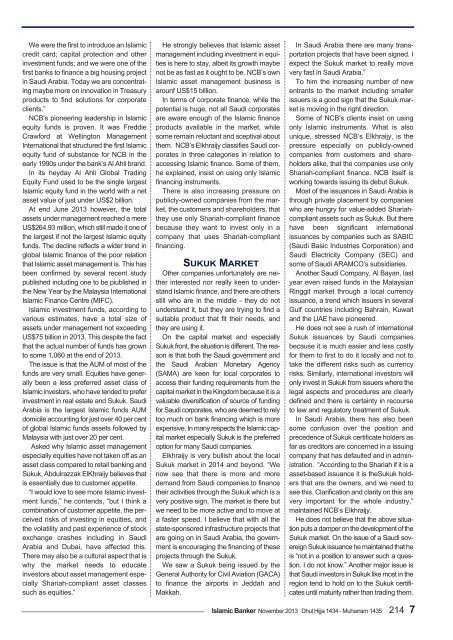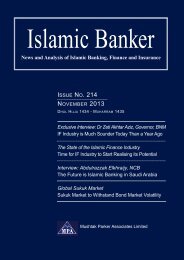You also want an ePaper? Increase the reach of your titles
YUMPU automatically turns print PDFs into web optimized ePapers that Google loves.
IB November 2013 final _IB_JanFeb 2010.qxd 06/03/2014 23:29 Page 7<br />
We were the first to introduce an islamic<br />
credit card; capital protection and other<br />
investment funds; and we were one of the<br />
first banks to finance a big housing project<br />
in saudi arabia. today we are concentrating<br />
maybe more on innovation in treasury<br />
products to find solutions for corporate<br />
clients.”<br />
ncb’s pioneering leadership in islamic<br />
equity funds is proven. it was Freddie<br />
crawford at Wellington management<br />
international that structured the first islamic<br />
equity fund of substance for ncb in the<br />
early 1990s under the bank’s al ahli brand.<br />
in its heyday al ahli global trading<br />
equity Fund used to be the single largest<br />
islamic equity fund in the world with a net<br />
asset value of just under us$2 billion.<br />
at end june 2013 however, the total<br />
assets under management reached a mere<br />
us$264.93 million, which still made it one of<br />
the largest if not the largest islamic equity<br />
funds. the decline reflects a wider trend in<br />
global islamic finance of the poor relation<br />
that islamic asset management is. this has<br />
been confirmed by several recent study<br />
published including one to be piublished in<br />
the new year by the malaysia international<br />
islamic Finance centre (miFc).<br />
islamic investment funds, according to<br />
various estimates, have a total size of<br />
assets under management not exceeding<br />
us$75 billion in 2013. this despite the fact<br />
that the actual number of funds has grown<br />
to some 1,060 at the end of 2013.<br />
the issue is that the aum of most of the<br />
funds are very small. equities have generally<br />
been a less preferred asset class of<br />
islamic investors, who have tended to prefer<br />
investment in real estate and sukuk. saudi<br />
arabia is the largest islamic funds aum<br />
domicile accounting for just over 40 per cent<br />
of global islamic funds assets followed by<br />
malaysia with just over 20 per cent.<br />
asked why islamic asset management<br />
especially equities have not taken off as an<br />
asset class compared to retail banking and<br />
sukuk, abdulrazzak elKhraijy believes that<br />
is essentially due to customer appetite.<br />
“i would love to see more islamic investment<br />
funds,” he contends, “but i think a<br />
combination of customer appetite, the perceived<br />
risks of investing in equities, and<br />
the volatility and past experience of stock<br />
exchange crashes including in saudi<br />
arabia and dubai, have affected this.<br />
there may also be a cultural aspect that is<br />
why the market needs to educate<br />
investors about asset management especially<br />
shariah-compliant asset classes<br />
such as equities.”<br />
he strongly believes that islamic asset<br />
management including investment in equities<br />
is here to stay, albeit its growth maybe<br />
not be as fast as it ought to be. ncb’s own<br />
islamic asset management business is<br />
arounf us$15 billion.<br />
in terms of corporate finance, while the<br />
potential is huge, not all saudi corporates<br />
are aware enough of the islamic finance<br />
products available in the market, while<br />
some remain reluctant and sceptival about<br />
them. ncb’s elkhraijy classifies saudi corporates<br />
in three categories in relation to<br />
accessing islamic finance. some of them,<br />
he explained, insist on using only islamic<br />
financing instruments.<br />
there is also increasing pressure on<br />
publicly-owned companies from the market,<br />
the customers and shareholders, that<br />
they use only shariah-compliant finance<br />
because they want to invest only in a<br />
company that uses shariah-compliant<br />
financing.<br />
suKuK mArKeT<br />
other companies unfortunately are neither<br />
interested nor really keen to understand<br />
islamic finance, and there are others<br />
still who are in the middle - they do not<br />
understand it, but they are trying to find a<br />
suitable product that fit their needs, and<br />
they are using it.<br />
on the capital market and especially<br />
sukuk front, the situation is different. the reason<br />
is that both the saudi government and<br />
the saudi arabian monetary agency<br />
(sama) are keen for local corporates to<br />
access their funding requirements from the<br />
capital market in the Kingdom because it is a<br />
valuable diversification of source of funding<br />
for saudi corporates, who are deemed to rely<br />
too much on bank financing which is more<br />
expensive. in many respects the islamic capital<br />
market especially sukuk is the preferred<br />
option for many saudi companies.<br />
elkhraijy is very bullish about the local<br />
sukuk market in 2014 and beyond. “We<br />
now see that there is more and more<br />
demand from saudi companies to finance<br />
their activities through the sukuk which is a<br />
very positive sign. the market is there but<br />
we need to be more active and to move at<br />
a faster speed. i believe that with all the<br />
state-sponsored infrastructure projects that<br />
are going on in saudi arabia, the government<br />
is encouraging the financing of these<br />
projects through the sukuk.<br />
We saw a sukuk being issued by the<br />
general authority for civil aviation (gaca)<br />
to finance the airports in jeddah and<br />
makkah.<br />
in saudi arabia there are many transportation<br />
projects that have been signed. i<br />
expect the sukuk market to really move<br />
very fast in saudi arabia.”<br />
to him the increasing number of new<br />
entrants to the market including smaller<br />
issuers is a good sign that the sukuk market<br />
is moving in the right direction.<br />
some of ncb’s clients insist on using<br />
only islamic instruments. What is also<br />
unique, stressed ncb’s elkhraijy, is the<br />
pressure especially on publicly-owned<br />
companies from customers and shareholders<br />
alike, that the companies use only<br />
shariah-compliant finance. ncb itself is<br />
working towards issuing its debut sukuk.<br />
most of the issuances in saudi arabia is<br />
through private placement by companies<br />
who are hungry for value-added shariahcompliant<br />
assets such as sukuk. but there<br />
have been significant international<br />
issuances by companies such as sabic<br />
(saudi basic industries corporation) and<br />
saudi electricity company (sec) and<br />
some of saudi aramco’s subsidiaries.<br />
another saudi company, al bayan, last<br />
year even raised funds in the malaysian<br />
ringgit market through a local currency<br />
issuance, a trend which issuers in several<br />
gulf countries including bahrain, Kuwait<br />
and the uae have pioneered.<br />
he does not see a rush of international<br />
sukuk issuances by saudi companies<br />
because it is much easier and less costly<br />
for them to first to do it locally and not to<br />
take the different risks such as currency<br />
risks. similarly, international investors will<br />
only invest in sukuk from issuers where the<br />
legal aspects and procedures are clearly<br />
defined and there is certainty in recourse<br />
to law and regulatory treatment of sukuk.<br />
in saudi arabia, there has also been<br />
some confusion over the position and<br />
precedence of sukuk certificate holders as<br />
far as creditors are concerned in a issuing<br />
company that has defaulted and in administration.<br />
“according to the shariah if it is a<br />
asset-based issuance it is thesukuk holders<br />
that are the owners, and we need to<br />
see this. clarification and clarity on this are<br />
very important for the whole industry,”<br />
maintained ncb’s elkhraijy.<br />
he does not believe that the above situation<br />
puts a damper on the development of the<br />
sukuk market. on the issue of a saudi sovereign<br />
sukuk issuance he maintained that he<br />
is “not in a position to answer such a question.<br />
i do not know.” another major issue is<br />
that saudi investors in sukuk like most in the<br />
region tend to hold on to the sukuk certificates<br />
until maturity rather than trading them.<br />
<strong>Islamic</strong> banker november 2013 dhul hijja 1434 - muharram 1435 214 7




